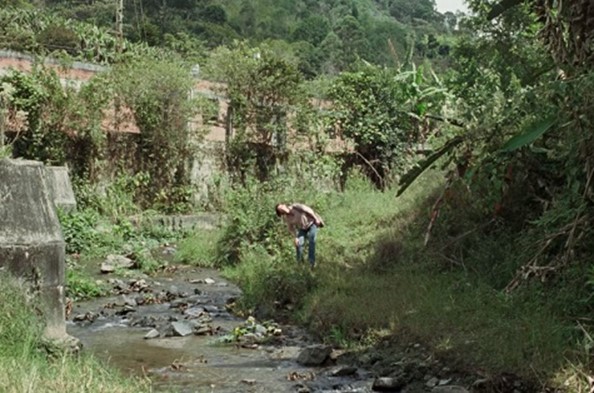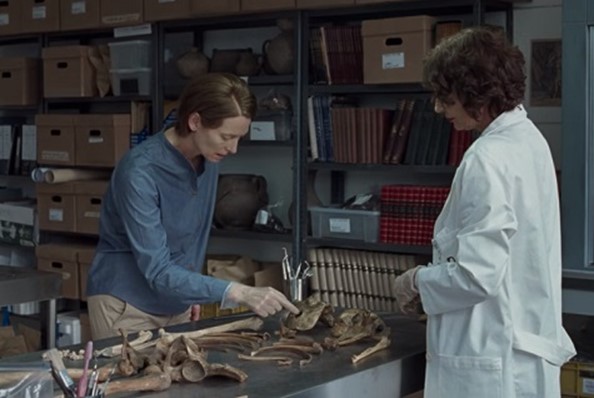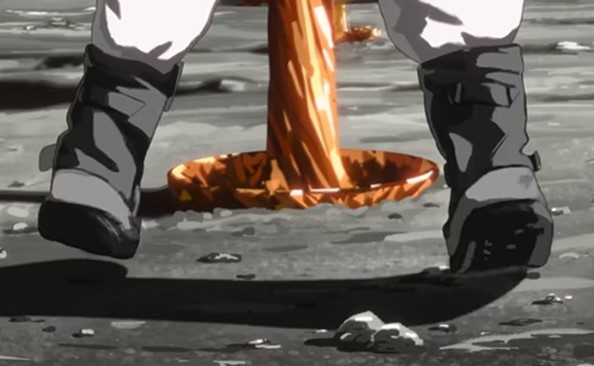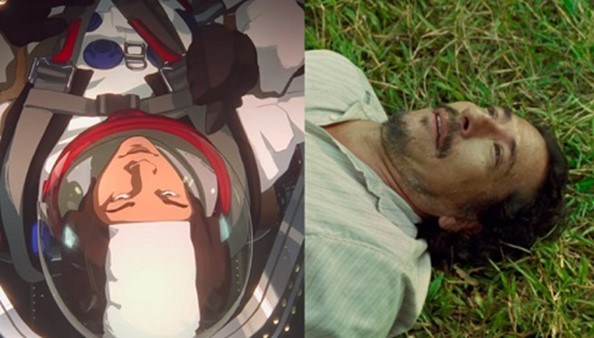Movies talk to each other. What did the films of 2022 have to say? This is a look at how two movies from the past year tackle similar subjects in different ways. Be warned, SPOILERS for Apollo 10 1/2 and Memoria follow.
This is way too late to be writing about the movies of 2022. We’re in April 2023! The Oscars are over and put the final cap on the old year, blockbuster season is just around the corner. All that’s left of last year are memories, which are not the same as the moments that stuck. Memories are slippier.
Richard Linklater has spent a lifetime looking at life and time, creating a body of work that “disrupts the easy forward flow of the past rolling into the present toward an oncoming future, in order to explore new configurations,” Holly Willis wrote after the release of Boyhood, a three-hour film collapsing 12 years of a young man’s life filmed in the real time of his growing up. He’s also drawn on his own life experiences — as a high schooler in the 70s for Dazed and Confused, as a college student in the early 80s for Everybody Wants Some!! — and the protagonist of Apollo 10 1/2 shares Linklater’s background as a kid growing up in Houston at the height of the space program. But young Stanley is not just fascinated by going into space, he is chosen by NASA for the titular mission, a secret test of equipment before the moon landing. He, not Neil Armstrong, will be the first person on the moon.
Or at least that’s what an older Stanley, voiced by Jack Black, tells the viewer. And in the telling, Black immediately swerves into lengthy digressions of suburban life in Houston, for nearly 2/3 of the movie he abandons the adventure for memories of Stanley and his sisters and parents and relatives and friends out on manicured lawns, eating fairly crappy food and watching unending television. Black’s voice is superb here, his manic edge toned down to wry reminisce but still engaging and warm — he triangulates between the irony of Jean Shepherd in A Christmas Story and the earnestness of Daniel Stern in The Wonder Years. And what he’s describing and what is shown don’t quite align. Linklater doesn’t press points, but Black’s amused recall of cramped car trips are seatbelt-less knots of bodies that would give Ralph Nader an aneurysm; kids frolic in yards through clouds of DDT sprayed by helpful workers keeping the grass green. And nearly all of the action was filmed but then rotoscoped — the actors are there but the backgrounds are mostly green-screened and then animated — and the technique creates a colorful distance from realism. Linklater used rotoscoping in Waking Life to evoke the uneven reality of dreams and the animators would add little fillips of fantastical imagery in the background; and in his adaptation of A Scanner Darkly the wavering drawings showed a reality that itself was constantly under question. Here the effect is not impressionistic in the fine art sense — it’s slicker and brighter with clearer lines while still maintaining warmth — but is showing an impression, an image that is being recalled with certain details while others are less intense.

One level of detail that is constantly present in these recollections is music. More than 40 songs make an appearance, from usual 60s suspects (“Down On The Corner” from CCR) to the familiar if less standard material (“Season Of The Witch” — the Vanilla Fudge version) to songs you know but didn’t know you know (The Mar-Keys’ “Pop-Eye Stroll“). It’s a barrage of tunes similar to Dazed and Confused or another memory piece, Spike Lee’s Crooklyn, the soundtrack of a life. What Tilda Swinton’s character Jessica hears in Memoria is different. It’s unknown and unwanted, hard to describe and for her alone. No one else can hear this noise, “a concrete ball dropped into a metal container in, perhaps, the ocean,” Jessica tells an audio engineer, trying to make sense of a sound that blasts her when she least expects it as she moves, dazed and confused, through Bogotá. Well, that’s not true — the audience can hear it as well. “The kineticism of Apichatpong Weerasethakul’s Memoria is auditory. So overwhelming is its impact that it would be ridiculous to say we watched or saw this movie,” Amy Taubin wrote in Artforum. “No: We listened to it, and the listening was accompanied by seeing.”
Weerasethakul has said his film will never be released for home consumption and that it will just play in theaters in a traveling roadshow. The theatrical soundsystem is necessary to convey not just Jessica’s mystery noise but the ambient sounds of the Colombian countryside, of a city bedroom in the dead of night, of an exuberant jazz combo making their own sound in sync with each other, playing for a crowd and offering a counter to the echo in Jessica’s head. But the theater itself is part of Weerasethakul’s design. It is a quiet space that also has an audience that can’t be quiet, as much as it may try. The space of the theater and how the movie and the audience fill it leaves plenty of room for the creak of a shifting seat, the crinkle of a candy wrapper, the rustle of a coat on a lap. These were part of the soundtrack at my screening, and now of my memory of the film.

I also remember nodding off a fair amount — a welcome reaction, apparently! — almost to the moment where that damn bang would come in and snap me to attention again, putting me very much in Jessica’s shoes. Swinton is extraordinary here, doing very little with no help from the camera but still conveying deepening unease, especially as Jessica seems to remember people dying that are very much alive, and helping a sick sister who appears to be just fine. Weerasethakul’s lengthy takes often make this uncanniness more apparent than “disjointed” editing would, we can see Jessica existing in this space and not connecting to the people who are in it, despite moments like that concert or a lengthy conversation with that engineer, who does manage to recreate that sound. But she really finds connection with a man she meets scaling fish in the country, he shares the name of Hernán with that engineer but instead of using a soundboard to bring noise out of air, he can tap any object around him for the memories it stores, like a rock that holds the tale of two brothers and a killing from centuries ago. Everything contains memories of the past if you listen.
At one point in Apollo 10 1/2‘s long stretch of not much in particular happening, Stanley’s father is driving the family around (no seat belts!) while casually drinking a beer. He cracks a new brewski while tossing the empty in the foot area of the passenger seat and tells the kid that a redneck chucks the can in the car but white trash throws it outside and litters. My father-in-law was much more responsible and apparently drinking soda at the time, but told my wife almost the exact same thing on a drive when she was young and seeing that on the screen brought the memory back to her immediately. This is what Linklater is up to, not just nostalgia (although that is present) but evoking the past with specificity that resonates back through others’ time, or creating spaces to receive others’ memories. Once again, Willis is writing about Boyhood but is halfway to describing Apollo 10 1/2: “It allows us to move back and forth between the figure and ground of story and history, between fictional characters and our own world, and in the process we witness the passage of time for a sustained and unparalleled duration.”

Hernán can hear memories everywhere but he does not dream and when Jessica, deprived of sleep from all this banging, asks him to demonstrate, Hernán lies back and dies. He dies for several minutes as Weerasethakul stays still and lets us witness the passage of time for a sustained and unparalleled duration. Only Jessica (and the audience) is there to see it and it feels breathless, which it is in a very literal way — death is not exactly uncommon but this feels like seeing something new. More than 600 million people stared at their TVs in 1969 to see a man step out onto the moon, to see something unprecedented and have that memory stay with them forever. Stanley falls asleep while all this happens, by the way — dreaming of how he got there first after some intensive training at NASA facilities, remembering how he left the first footsteps in the moon’s dust before his spaceship blasted off.
And it is, of all things, a spaceship blasting off that has made the noise invading Jessica’s head — Weerasethakul shows us the alien craft rising out of the jungle, plain as day, after Jessica and a rewoken Hernán drink a fair amount of hooch and Jessica starts to transmit memories that are not her own. Is it happening right now, its boom echoing backward to a few weeks in the past? Did it happen millenia ago and echo forward until it found Jessica the receiver? Or maybe it’s from even farther in the future? The sound and the action have been decoupled from our normal understanding of memory. And did you know that the original footage of Armstrong and Aldwin planting their feet on a new ground, something seen by a sixth of the world’s population, is gone forever? NASA taped over it.

When I was about Stanley’s age, I was walking home from elementary school and about 25 yards from my house, kicking leaves in the gutter by the big culvert running under the road and thinking about War With The Evil Power Master, one of the many Choose Your Own Adventure books I’d been burning through. I was thinking about one of the book’s odder endings, where You the protagonist, are transported across space and time to become an old, dying shell of yourself, barely remembering your adventures (apparently the Evil Power Master’s many dastardly deeds included copyright infringement on 2001: A Space Odyssey). What would it be like to be old and looking back on your life like that, I thought? Wait a minute — am I just a memory of my older self? What if all this — the street, the leaves, my house right ahead, my very perceptions — is just a recollection? It’s an idea that’s unnerved me enough to stick in my brain for 30 years, where now I approach it from the other side. Was that the right CYOA book? (Maybe it was actually Prisoner of the Ant People.) Were there leaves on the ground? How much of this memory of my young self thinking about my old self is real?
Apollo 10 1/2 ends with Stanley looking back and ahead at the same time, the boy gazing across the galaxy from his spaceship, seeing the sun from a new perspective and watching tomorrow hit today is also the man telling us how that boy thought he lived. The future and past are not collapsed into now, but “time is suspended and questioned; it is reconfigured, recombined, reoriented,” Willis says. After the spaceship’s launch and a flurry of sounds from out of time, Memoria ends with Jessica noticeably absent and the patter of rain over the credits, a more familiar sound than the UFO’s boom but an ominous one to my ears. But if it doesn’t provide answers it’s also a reorientation, it is one more sonic space to sit in with the other viewers of the movie and think on a new way of seeing, on what we saw and what will be in our memories.
In a very deep dive into Weerasethakul’s career, Dennis Zhao considers Memoria as a counter to the idea of an endless present’s “empty time,” as opposed to the interconnected (if not always clearly) past and future of “messianic time.” Empty time is tied to the idea of progress and what could be more emblematic of progress than the moon landing? “Nothing can stop the shape of things to come,” Max Frost and the Troopers warn as Apollo 10 1/2‘s credits roll. But Linklater knows the future is a real place, not a destination, and it can’t help but look back to the past for the shape of things that were. His shapes are flat and colorful, Weerasethakul’s are vivid but enigmatic. Their memories both pinpoint and expand time beyond a narrow and linear progression. The world moves on but the memory – or at least a memory – remains.


